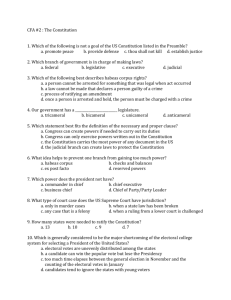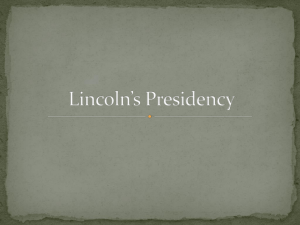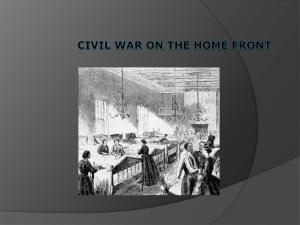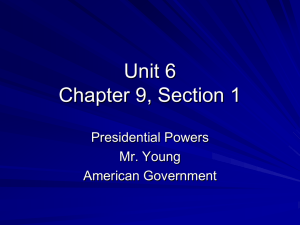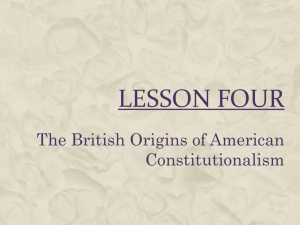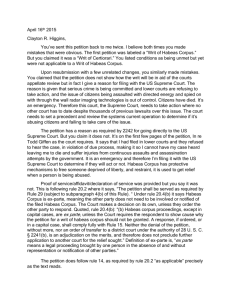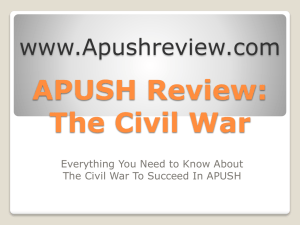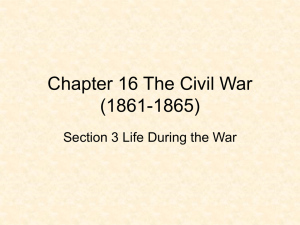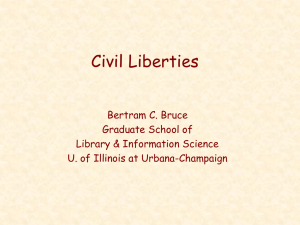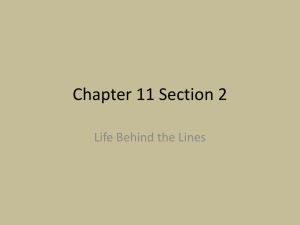Running head: WAR ON TERROR WAR ON TERROR Civil Liberties
advertisement
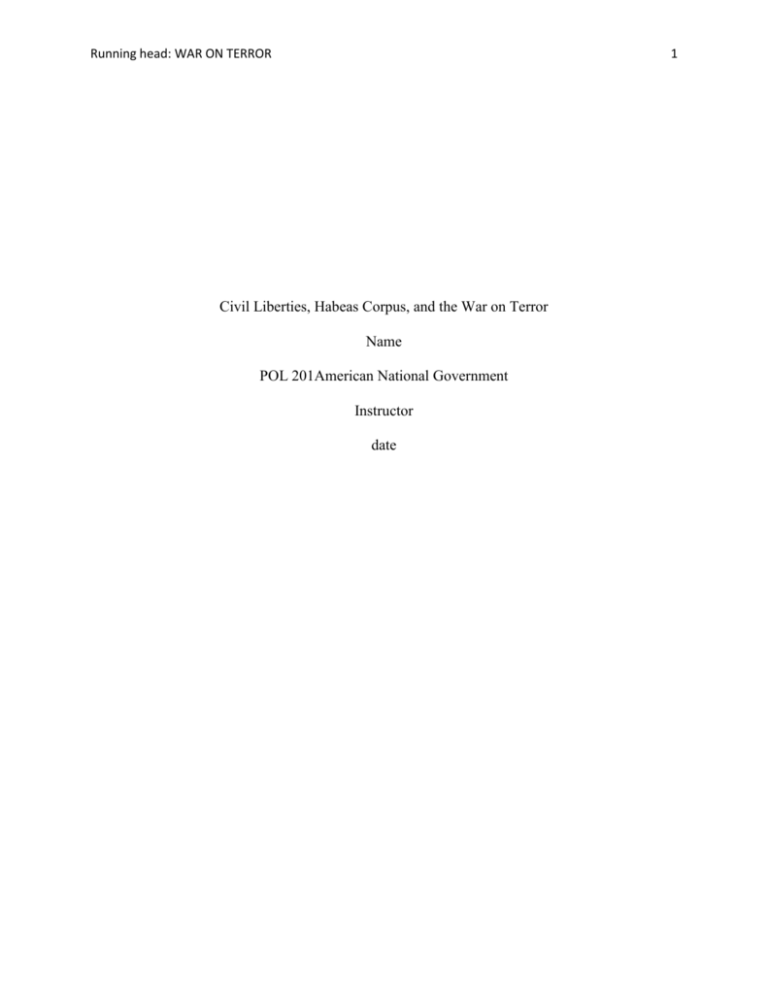
Running head: WAR ON TERROR 1 Civil Liberties, Habeas Corpus, and the War on Terror Name POL 201American National Government Instructor date WAR ON TERROR 2 Civil Liberties, Habeas Corpus, and the War on Terror Throughout history, the motivation of man's self interest has concluded in the domination of those with little or no power in the absence of the rule of law. The war on terror presents an unpredictable challenge for the United States whereas terrorists are apprehended and deprived of due process. The right of Habeas corpus overrules man's interpretation, in which allows those accused federal and state court representation before judge, or jury. It asserts that accusers deemed innocent until proven guilty, accusers possessed the right to representation, appear in person, and charges brought forth. This essay will concentrate on the evolution of habeas corpus, and its suspension by the United States, its relevance during the war on terror, and the United States Supreme Court's interpretation. Nevertheless, these laws are in place to protect every one, moreover to avoid unlawful apprehension, and ensure that habeas corpus works as intended by the Constitution. The historical evolution of habeas corpus born from the Magna Carta, known as the English Bill of Rights began in England in the early 1200s. Under force from English barons, King John of England placed his signature on the Magna Carta in 1215, in which comprised of a list of human rights and civil liberties. It asserted that the King needed consent from his legislative body to impose taxes upon its citizens. Halliday (2011) notes that habeas corpus serves as a writ and a scrabble parchment that a judge ordered a jailer to bring forth a named prisoner to court to face said written charges. This very important document additionally established that trial and due process of law must occur previous to confiscating property or freedom from any free man who resided in England. Instead of King John stepping down from power he agreed to place boundaries on the power of the monarchy, sign the Magna Carta, wherein honored the constitutional rights and privileges of his countrymen. WAR ON TERROR 3 This document serves as a treaty of union, and agreement with the King wherein guaranteed and respected the civil liberties (personal freedoms) (Levin-Waldman, 2012) of its citizens. Only in the presence of rule of law prohibits countrymen from depriving countrymen of basic human rights. Politicians, and citizens augur that this act occurred in America when the national Defense authorization act (NDAA) passed in 2011. Opponents suggests that this bill proves unconstitutional for the reason that it strips away habeas corpus, thus allowing the detainment of American citizens suspected of terrorist activity for an indefinite period devoid of a trial. Other politicians, and citizens consider this act stands as a breach of the Posse Comitatus Act of 1876 in which forbid the Army's participation in domestic lawful assembly on American soil. The suspension of habeas corpus number in the few for good reason, and presidents, politicians, and Supreme Court justices auger whether or not the Constitution offer provisions to commit such an act. However, the rights of habeas corpus denied by President Abraham Lincoln in 1862 during the American Civil War, and in 2006 by President George Bush fighting the war on terror. The reasons for the suspension of habeas corpus by Lincoln and Bush were worlds apart as explained by Foner, (n.d.). Foner notes that Lincoln were perhaps on the threshold of losing a nation; whereas, Bush believe it essential to detain prisoners of war without due process of law after the attacks by terrorists on September 11, 2001. The Military Commissions Act of 2006 signed into law by President Bush gave unlimited authority toward establishing a military commission. On the other hand, Lincoln deemed it vital to protect a stretch of land from Baltimore to Washington DC. This railroad line involved transportation, troop movement, and delivering supplies. Only in the occurrence of rebellion or invasion does the president possess the power to suspend the writ of habeas corpus; however, the WAR ON TERROR 4 terms rebellion, and invasion takes on several meanings, and which undergo litigating through generations to generation. In other words, in grave situations concerning the safety of the public, the federal government can incontestably suspend the privilege or writ of habeas corpus under the Constitution. On July 12, 2008 majority justice Kennedy joined by Breyer, Ginsburg, Souter, and Stevens held that prisoners at Guantanamo Bay suspected of committing terrorism possess constitutional rights, in which allows them the process of challenging their detention in the United States civil court of law. The courts only reiterated that before the Bill of Rights appeared in the Constitution, habeas corpus stood as a civil right for prisoners of war. The Bush administration drew heavy scrutiny regard to civil rights from majority justice Kennedy regarding those detained at Guantanamo, in which he concluded that the Constitution warrants nothing less than full habeas corpus. Some members of the Supreme Court consider the act of Denying any prisoner of war, especially Afghan soldiers stands one of those extreme measures in which the government denies habeas corpus, thus committing war crimes under the Geneva Convention. Moreover, the three branches of the United States government collectively recognize the Geneva Convention as binding (Katyal, Bongiovanni, & Valentini, 2007). On the other hand, for many court justices denying rights to terrorists seems deserving of anyone who sets out to kill innocent people anywhere although not in the act of war; nevertheless, Congress does not possess the power to strike away these rights. However, Congress provided the federal courts will habeas corpus jurisdiction from its inception, and it will take affirmative action to withdraw jurisdiction (Vladeck, 2010). Fighting the war on terror proves the most unconventional war any country face. These individuals entire life consist of killing Americans citizens or anyone (infidels) meaning those who do not accept Islamic faith WAR ON TERROR 5 when and wherever an opportunity present itself. People speculate that should mindless rhetoric, such as this merit traditional representation of the Constitution, and the answer varies throughout the nation. There proves a need for habeas corpus because of its humane connotation. In other words, every form of torture, and some critics make auger that some form of torture considered beneath the conduct of the United States; moreover those that participate in such a manner prove not worthy of wearing the United States military uniform. Many Americans believe the Bush administration proceeded overzealously in the efforts to fight terrorism. Nevertheless; subsequent to terrorists striking down the World Trade Center buildings in New York City, American citizens wanted the United States to strike back immediately with deadly force. Just under 4000 citizens perished in the attacks bestowed on New York City on September 11, 2001, and the Bush administration worked tirelessly to gather intelligence before making decisive maneuvers to bring those responsible to justice. Niday, (2008) notes that in the immediate wake of 9/11 the war receive near unanimous support of the war on terror from both sides of the aisles and the Bush administration employed terms such as illegal combatants, and enemy combatants to bolster its campaign. In times of calamity, Americans, and people throughout the world stand at their best, and pull together in unison to aid one another. One could almost surmise that Americans may fight among each other issues of race, politics, and human rights; however, failed to allow others to come hashed out devastation on other Americans on American soil, or anywhere in the world. Common knowledge demonstrate that wealthier Americans; moreover, the rich in general do not serve equal time in jail for crimes committed as the poor. One have to surmise that people work their entire lives to amass riches to achieve an advantage in the world; even if it means special treatment in regard to unequal justice. Even though Betty v. Bradley deprived lawful WAR ON TERROR 6 representation to accusers charged with a crime; however, unable financially to secure representation in 1942, the Supreme Court ruled that the right of legal representation, and the sixth amendment obligated states to provide legal counsel nonetheless (Levin-Waldman, 2012). The writ of habeas corpus provides everyone the right to judge, jury, and trial. This law protects citizens from tyranny, unlawful arrest, and imprisonment without legal representation. The writ of habeas corpus presently address, or intervene between several procedures, (e.g., post convictions, prisoners not charged with a crime, prisoners awaiting trial, death row inmates, and prisoners serving long sentences than usual. The idea of habeas corpus will materialize often when discussing matters of civil liberties and the Constitution, and obviously people in general believe totally in this fundamental right. In the case of major disasters, such as Hurricane Katrina prove the shortcomings of government, and the incorrect intelligence toward finding weapons of mass destruction only substantiate that government assertions may turn out false. Nevertheless, that proves why the right to habeas corpus (a fair hearing before an impartial judge) proves written in the Constitution. Injustice anywhere prove injustice everywhere, and people in the United States regardless of their stature, and wealth stand guarantee the fundamental rights of due process under the law of habeas corpus. The Constitution of the United States make America the greatest country in the world; however, there are those constantly challenging the weight of the Constitution, pushing amendments to uncharted territories, and denying fundamental rights to those thought less deserving. Nevertheless, American patriots stand proud of the idea of a totally free nation, in which every ethnic group, men, and women can thrive together on the rule of law. WAR ON TERROR 7 Reference Bradley, C. (2010). Clear statement rules and executive war powers. Harvard Journal of Law and Public Policy, 33(1), 1439-148. Document ID: 1950961981. Foley, B. (2007). Guantanamo and beyond: Dangers of rigging the rules. Journal of Criminal Law & Criminology, 97(4), 1009-10069. Document ID: 1466824931. Retrieved from ProQuest Central database, in the Ashford Online Library. Foner, E. (n.d.). Lincoln’s abuse of the presidential power [Video]. Available from http://www.5min.com/Video/Lincolns-Abuse-of-the-Presidential-Power-294084084 FOR A.tv. (2009). Gitmo and the writ of habeas corpus [Video]. Available from http://www.5min.com/Video/Gitmo-and-the-Writ-of-Habeas-Corpus-516897065 Halliday, P. (2011, March 17). Habeas corpus: From England to Empire [Video]. Available from http://www.c-spanvideo.org/program/298560-5 Katyal, N., Bongiovanni, G., & Valentini, C. (2007, December). Terrorism, emergency powers, and the role of the U.S. Supreme Court: An interview with Neal K. Katyal. Ratio Juris, 20(4), 443-455. Retrieved from Academic search Premier (EBSCOhost), in the Ashford Online Library. Levin-Waldman, O. M. (2012). American government. San Diego, CA: Bridgepoint Education, Inc. Niday, J. (2008). The war against terror as war against the Constitution. Canadian Review of American Studies, 38(1), 101-117. Retrieved from Academic Search Premier (EBSCOhost) database, in the Ashford Online Library. Vladeck, S. (2010). The unreviewable executive: Kiyemba, Maqaleh, and the Obama WAR ON TERROR administration. Constitutional Commentary, 26(3), 603-623. Retrieved from Academic Search Premier (EBSCOhost) database, in the Ashford Online Library. 8
